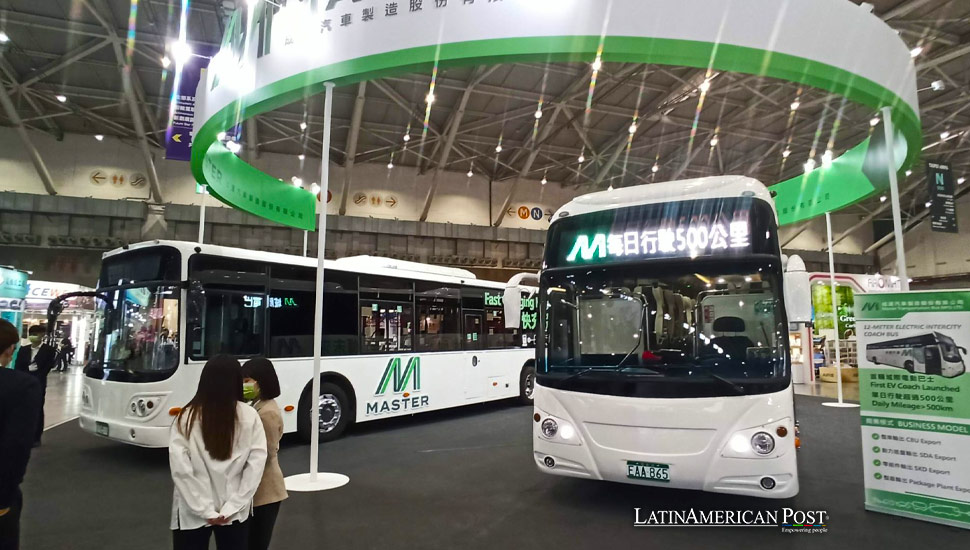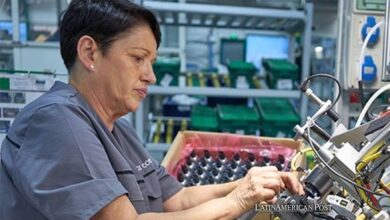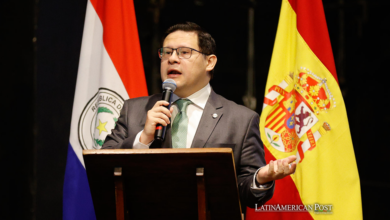Taiwan’s Master Bus to Establish Electric Bus Plant in Paraguay

Taiwanese company Master Bus is set to inject $30 million into Paraguay’s economy with the establishment of an electric bus manufacturing plant. This significant investment, slated to begin operations in 2025, is expected to create a substantial 1,200 jobs, marking a pivotal moment in Paraguay’s economic and technological advancement.Byline: Latin American Post Staff
In a momentous development for Paraguay’s burgeoning industrial sector, Taiwanese firm Master Bus has announced an investment of approximately $30 million to establish an electric bus manufacturing and assembly plant in the country. The new facility, which is expected to commence operations in 2025, will create around 1,200 jobs, substantially boosting the local economy and advancing Paraguay’s technological capabilities in electromobility. This strategic move not only strengthens Paraguay’s economic position but also enhances its diplomatic ties with Taiwan.
The announcement was made in Asunción by the Ministry of Industry and Commerce (MIC), highlighting the significant benefits and opportunities this investment will bring to the South American nation. The arrival of Master Bus to Paraguay was formalized through a memorandum of understanding signed in Taipei between the Paraguayan Ministry of Industry and Commerce and Master Bus.
“This is an important achievement. We are making firm strides, and we will surely have this industry up and running next year, with the enormous benefits it brings,” stated MIC Minister Javier Giménez in the official communication. He further estimated that the factory’s opening will generate around 1,200 jobs, many of which will be filled by Paraguayan students currently studying in Taiwan.
Technological Advancements and Economic Impact
The establishment of Master Bus’s plant in Paraguay is not just a technological leap, but a strategic move that positions the country as a key player in Latin America’s sustainable transportation solutions. Minister Giménez highlighted that the Taiwanese firm’s presence will drive technological development, reduce fossil fuel imports—which currently cost Paraguay around $100 million annually—and bolster the country’s standing in the region.
The partnership between Paraguay and Master Bus is not just an economic alliance, but a testament to the country’s unique diplomatic stance. As the only South American country with official diplomatic relations with Taiwan, Paraguay’s commitment to fostering robust international partnerships is underscored. This strategic alliance with Master Bus further strengthens bilateral cooperation and opens doors for economic investments and technological collaborations.
Diplomatic and Economic Context
The announcement coincides with a visit to Taipei by a Paraguayan delegation led by President Santiago Peña, who attended the inauguration of Taiwan’s new president, William Lai (Lai Ching-te). The delegation also included prominent officials such as Foreign Minister Rubén Ramírez, Minister of Information and Communication Technologies Gustavo Villate, Chief of the Civil Cabinet Lea Giménez, and Speaker of the Paraguayan Chamber of Deputies Raúl Latorre.
Paraguay’s steadfast diplomatic support for Taiwan is a significant element of its foreign policy. It is one of only 12 countries worldwide that maintain official diplomatic ties with Taipei. This relationship strengthens bilateral cooperation and opens doors for economic investments and technological collaborations, such as the Master Bus project.
Paraguay’s relationship with Taiwan dates back to 1957, and over the decades, this alliance has facilitated numerous economic, educational, and technological exchanges. The partnership has been instrumental in various developmental projects in Paraguay, including infrastructure development, education initiatives, and technological advancements.
The decision by Master Bus to invest in Paraguay can be seen as a testament to the firm and enduring ties between the two nations. It also reflects the broader trend of Taiwan seeking to bolster its presence and influence in Latin America amidst increasing geopolitical competition.
The electric bus manufacturing plant represents a forward-looking initiative aligned with global sustainability trends and green technology. Paraguay is taking a significant step towards reducing its carbon footprint and promoting environmentally friendly transportation solutions by embracing electromobility.
Employment and Educational Opportunities
One of the most notable aspects of the Master Bus investment is its potential impact on employment and education in Paraguay. Creating 1,200 jobs will provide substantial opportunities for the local workforce, particularly for young professionals and students.
Minister Giménez highlighted that Paraguayan students pursuing studies in Taiwan will occupy many new positions. This investment underscores the importance of international education and training programs in preparing a skilled workforce capable of supporting advanced technological industries.
Establishing the electric bus plant presents numerous opportunities, but it also comes with its challenges. Ensuring the successful integration of advanced manufacturing technologies and maintaining high production quality standards will be critical. Additionally, the project will require substantial logistical and infrastructural support, including reliable energy supplies and transportation networks.
Furthermore, the plant’s success will hinge on the ability of local businesses and suppliers to adapt to and support the new industrial ecosystem. This includes developing a robust supply chain capable of providing the necessary components and materials for electric bus production.
Regional Impact and Sustainability
The Master Bus investment in Paraguay has broader implications for the Latin American region. As countries across the continent grapple with the challenges of urbanization and environmental sustainability, the development of electromobility solutions becomes increasingly important.
Paraguay’s move to embrace electric bus manufacturing positions it as a regional leader in sustainable transportation. This initiative can serve as a model for other Latin American countries seeking to reduce their reliance on fossil fuels and transition to cleaner, more sustainable energy sources.
In Latin America’s history, the shift towards electromobility represents a significant departure from traditional economic models that have often relied on extractive industries and fossil fuels. By investing in green technologies, Paraguay contributes to a more sustainable and resilient future for the region.
Master Bus’s decision to establish an electric bus manufacturing plant in Paraguay marks a significant milestone in the country’s economic and technological development. This investment promises to create substantial employment opportunities, enhance technological capabilities, and reinforce the strong diplomatic ties between Paraguay and Taiwan.
As Paraguay continues to advance its industrial and technological sectors, the successful implementation of the Master Bus project will serve as a testament to the country’s potential as a hub for sustainable transportation solutions in Latin America. This initiative highlights the importance of international cooperation and strategic investments in driving economic growth and promoting environmental sustainability in the region.
Also read: Record High Cocoa Prices Drive Sustainable Farming in Peru’s Amazon
Paraguay is setting a precedent for other Latin American countries to follow by embracing electromobility and fostering technological innovation. The Master Bus investment is more than just a business venture; it is a step towards a greener, more sustainable future not only for Paraguay but also for the entire Latin American region. This initiative has the potential to transform the region’s transportation sector and contribute significantly to its environmental sustainability.





